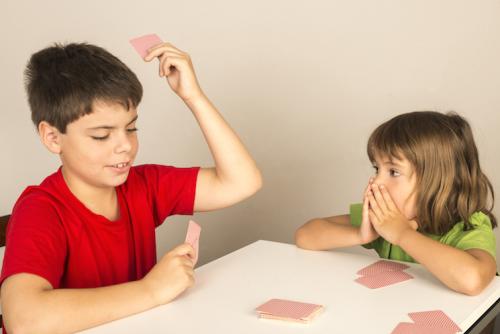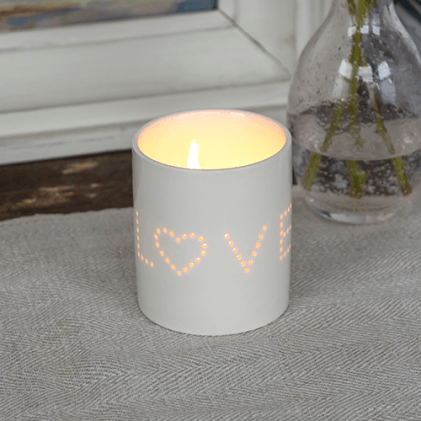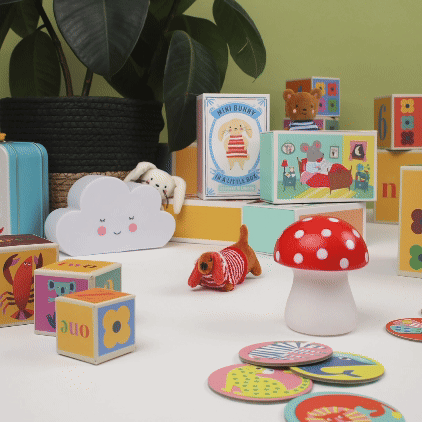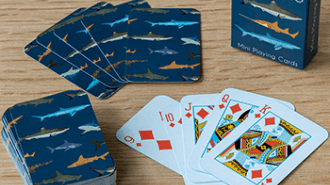6 card games your family will love
Turn off the tech and prepare to swap screen time for some good old fashioned family fun. We’re talking card games - an ‘ace’ way to spend a chilly autumn evening with your loved ones.
We’ve been reminiscing about the best family card games we played when we were younger. With help from some of our favourite bloggers, here’s what we found.
Go Fish

Go fish in Flamingo Bay
Pictured above: Flamingo Bay Playing Cards In Tin - £4.95
The aim of the game is to collect sets of four matching cards. Start by dealing out five cards per player and lay the rest face down in the centre, as this is the fishpond.
The first player kicks off by asking the person to their left for a card they need. If the second player has this card they must hand it over. If they don’t have it, the second player says ‘Go Fish’ and the original player takes a card from the pack or ‘fishpond’ as it’s known. If this card is what they want, they say ‘I fished upon my wish’ before asking for another card. As sets of four are formed, players lay them on the table. The winner is the first player to place all their cards on the table in sets of four.
Tracy Whitelaw, a blogger at Games Champ suggests a speedier version of the game where players collect pairs instead of all four of a set.
Spoons
It’s noisy, addictive and requires lightning reflexes. Spoons is an ideal starter game for younger members of the family, as it’s simple and exciting to play. Agony aunt, Jenny of The Leap says:
‘Spoons will have you all fighting, laughing and scrambling your way to not be knocked out.’
The aim of the game is to collect four matching cards. Start by placing the spoons in the middle of a circle of players and dealing out four cards to each person. Make sure there is one less spoon than the total number of players (eg. 5 players = 4 spoons).
Everyone decides which cards to keep, and then passes one they don’t want to the player on their left. When a player has four matching cards in their hand, they pick up a spoon. This is the signal for everyone else to grab a spoon. The loser is the player who ends up spoonless. The key to winning is all about timing and stealth, blogger Peter Steward explains:
‘There is a great art in quietly taking a spoon without other players seeing it happen. Then just watch the scramble for spoons when they realise one has gone.’
Old Maid
This classic card game was a hit in Victorian times and is still popular. Every summer holiday, as soon as Puffin Diaries blogger Mrs H and her family arrive at their caravan, someone asks to play Old Maid:
‘For such a simple game it has given us hours of pleasure, the delight in giving her away and the excitement of trying to pass her on, that Old Maid has much to be thanked for. I will definitely pack her again this year.’
The aim of Old Maid is to collect matching pairs of cards. Remove one queen from the deck and deal out all the cards, then ask each player to lay down any pairs they have. The player to the left of the dealer then fans out their cards, making sure they are hidden from their neighbour, who picks one. If the card they choose makes a pair, they can lay down the pair. If not, they keep it. The game keeps going like this until all the cards have been paired up and the player left with the queen is the loser.
Old Maid is perfectly playable with a standard pack of cards but you can also use special packs featuring comic characters. Karon Grieve who blogs at Larder Love discovered a deck in her local antique shop:
‘So what was I doing yesterday morning when I was meant to be at the bank and post office? Yep, there I was in the back room of the antique shop playing ‘Old Maid’ with the boys. The hilarity levels rose by the minute. Just who was going to be stuck with Azz I Said or Hazel Hazzit, or no, no, no, quelle horreur – Old Maid.’
Snap

Simple and speedy
Image source: Shutterstock
From nursery characters to classic cars, modern snap cards come in a huge variety of designs, but the original cards, published by John Jaques and Son Ltd in 1866, featured 64 grotesque characters.
Just in case you missed out on this two player childhood classic, here’s how to play. Deal out the pack and take it in turns to place a card face up onto a central pile. When your card matches the one preceding it, shout snap as quickly as you can. The first person to shout snap wins the pile and the overall winner is the player who wins all the cards.
Snap’s simplicity means it’s great for teaching children how to take turns and stick to rules. It’s also quick to play, which makes it ideal for keeping fidgety fingers out of mischief. At least, that’s the theory. Actress Imogen Stubbs experienced the opposite when she was a young church chorister:
‘Services were always full of incident, we used to play snap in the pews, or marbles, which ended up rolling towards the vicar.’
Cheat
If you’re struggling to get older kids switched on to card games, try cheat, as it’s all about being creative with the truth. Blogger Jane Brocket says: ‘I had no idea how much teenagers could enjoy daft card games such as cheat and snap (the only two I can ever remember).’
A game of cheat requires at least four people and the aim is to get rid of all your cards by bluffing. The first player places a number of matching cards (eg. two 2s) face down on the table and declares what they are. The other players have to decide whether the first player is telling the truth or cheating.
If someone calls cheat and they’re right, the cheating player takes the central pile of cards. If they didn’t cheat, the challenger gets the pile. If no one calls cheat then play passes to the next player, who has to lay down cards of the following rank (so if first player laid 2s, the second has to play 3s).
Most children love this game and the opportunity to ‘break the normal rules’… but there’s always an exception. Blogger Tim Manneville remembers feeling uneasy about rebelling:
‘While I understood what the game was about, I literally could not bring myself to ‘cheat’, even though it was part of the rules. If I ever found myself in a situation in which I had no valid cards to play, I would always choose to call ‘cheat’ on the most recent player rather than bluff myself.’
Beggar my neighbour

You’ll soon remember the rules!
Pictured above: Ditsy Garden Playing Cards In A Tin - £4.95
You need 2-4 players for this family favourite. All of the deck is dealt out, and players keep their cards face down in front of them. To start, the first player puts their top card face up in the centre of the table.
The next players lay down their cards in turn, until someone plays a ‘court card’ (jack, queen, king or ace). When one of these cards is played, the next player must make a payment. A jack commands a payment of one card, a queen two and a king three. An ace requires four cards. If one of the payment cards is a court card, that player stops paying out and the next player takes over! This carries on until the right number of cards has been paid out without a court card appearing. The player that finishes the payment collects the whole pile of cards. As the players run out of cards, they are out and the winner is left holding all the cards.
Don’t worry if the rules sounds a little complicated. Give Beggar My Neighbour a go and you’ll soon be whiling away the hours with this engrossing game, like blogger Kat of Does my bum look 40 in this?:
‘Lovely day mooching around at home and then a Sunday afternoon in the pub with the kids playing cards. Beggar my neighbour - for hours. Totally hilarious and took me back to being a kid.’
Playing cards from Rex London
If we’ve inspired you to relive your card playing memories, check out our range of playing cards. There are plenty of eye-catching designs to choose from and each deck comes in a matching tin. Get the family together and you’ll soon be card playing connoisseurs.

Playing Cards In Tin pictured above (from left to right): Little Red Riding Hood, Bicycle - both £4.95












